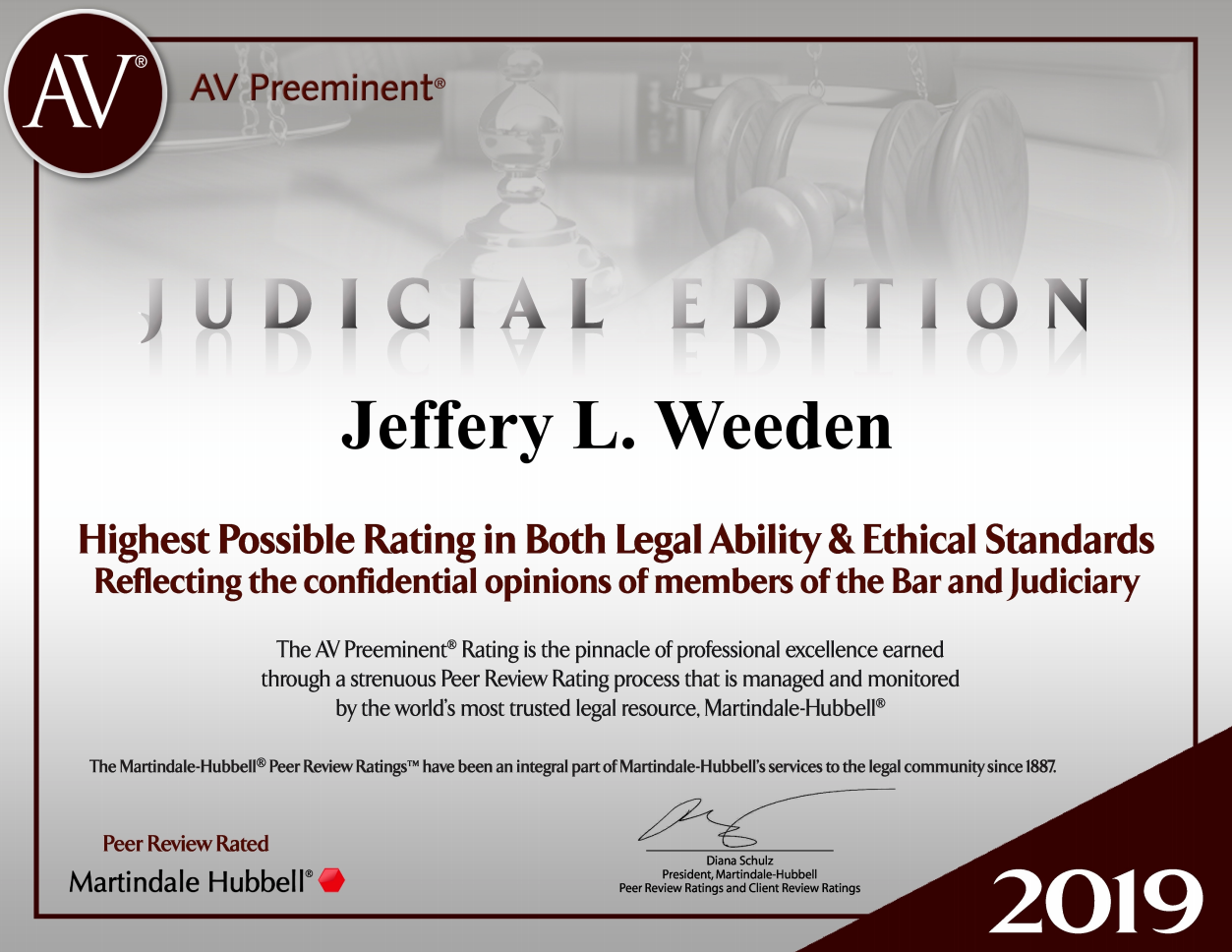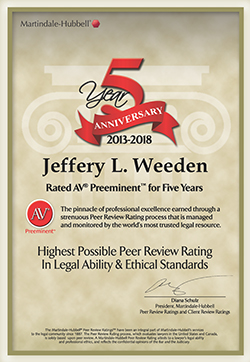Don’t Allow a Careless Mistake to Derail Your Child’s Life – Hire a Juvenile Lawyer at WeedenLaw

You want to give your child the autonomy they need to learn how to make good decisions on their own. You reason that if they are going to make mistakes, it is better for them to make them when they are young when the consequences are less severe and they have more time to recover and learn from them. Generally speaking, this is good parenting. Adolescents and teens need a bit of freedom to figure out who they are, what they want from life, and simply to have the ability to operate on their own as human beings rather than being constantly dependent on you.
Sometimes, however, kids make such mistakes where the consequences are too severe to let them suffer. Being charged as a juvenile is not a learning experience – it is something that can utterly derail the life they are working to build, making it harder to do things like get into college, find a good job, or even finish high school. If you find yourself dealing with the horror of having your child accused of a crime, you need to act quickly if you want to protect their future and minimize any damage that might be done.
At WeedenLaw, our Denver criminal defense attorneys have successfully represented juvenile defendants between the ages of 10 and 18 across the state of Colorado, and our lawyers understand what it takes to work toward resolutions that will not jeopardize the long life they have ahead of them.
What are Some Common Juvenile Crimes?
There are all kinds of ways that adolescents and teens can find themselves on the wrong side of the law, and in his years defending their rights, experienced juvenile defense attorney Jeff Weeden has seen just about everything. From petty theft and shoplifting offenses all the way to aggravated battery. Some of the cases that most frequently arrive in our office include the following:
- Arson
- Assault & battery
- Domestic violence (or dating violence)
- Driving under the influence of alcohol or drugs (DUI or DWAI)
- Drug crimes (including marijuana crimes and other types of drug possession as well as drug trafficking)
- Minor in possession of alcohol (MIP)
- Criminal mischief
- Sexual assault or other sex crimes, including sexting
- Theft (shoplifting/retail theft, burglary, robbery, auto theft, etc.)
- Trespassing
- Vandalism
- Weapons charges
Colorado Age of Consent Laws
In addition to these, some of the issues we tend to see a lot of as a Colorado juvenile defense attorney team involve age-of-consent laws.
C.R.S. 18-3-402(1) states that: “Any actor who knowingly inflicts sexual intrusion or sexual penetration on a victim commits sexual assault if: … (d) At the time of the commission of the act, the victim is less than fifteen years of age and the actor is at least four years older than the victim and is not the spouse of the victim; or (e) At the time of the commission of the act, the victim is at least fifteen years of age but less than seventeen years of age and the actor is at least ten years older than the victim and is not the spouse of the victim …”
The layman’s version of this is that Colorado’s age of consent, regardless of the sex of either party, is 17. However, there are some exceptions. Minors aged 15 and 16 are legally allowed to engage in consensual sex with those less than 10 years older, and those younger than 15 may engage in consensual sex provided their partner is less than four years older. (It is important to note, though, that these exceptions do not apply if the older party is in a position of trust over the person under the age of 18.)
Jeff Weeden has written additional Colorado age of consent information that we invite you to read if you have further questions.
What are the Consequences of a Juvenile Offense Conviction?
There are a number of consequences that come with a juvenile criminal charge and/or conviction. These include the following:
- Custody. When an officer notices a minor engaging in illegal activity, the first step is to take them into custody.
- Notice. Once the child is in custody, a notice will be sent to their parent or guardian.
- Release or mandatory hold. For most juvenile crimes, the minor will be released to their parent or guardian at this point. However, if the act involved violence or weapons, it is mandatory for them to be held by law enforcement.
- Screening. If the minor is not released, the next step is for them to undergo a screening using detention criteria. Based on the results of this screening, there are a number of options for what may happen next. They may be released to Services, or to their parent or guardian. Alternatively, they could be sent to a shelter, a staff secure facility, a temporary holding facility, or detention.
- Detention and shelter hearing. Any minors not released to their parent or guardian will then need to go through a detention and shelter hearing within 48 hours of being taken into custody. Based on the results of this hearing, they will then either be released to their parent or guardian, released to Services, or they will stay in a secure facility or shelter. Bail may also be set at this time.
- DA investigation. At this point, the DA will look at the case. If he or she determines that the minor should receive diversion or informal adjustment, they will receive those consequences and that is the end. However, if the DA files a petition or files in district court, the case continues.
- Adjudication. This is the part that will involve the actual court trial, if necessary.
Juvenile Sentencing Laws
If your child is over the age of 10 but under 18 and they are accused of committing an illegal act, they will most likely have their case handled by the Colorado juvenile justice system. There are a few ways that juvenile sentencing in Colorado might proceed. If there is a direct filing to the district court, it means that the minor is going to be sentenced as an adult. Obviously, this is one of the biggest things you want to try to avoid. If, on the other hand, there is a filing of petition, the case will continue moving forward in juvenile court with hearings, investigations, pleas, and so on. In juvenile cases, there must be an adjudicatory trial within 60 days if the case has not been resolved before then.
If the minor is found not guilty, that is the end of the case. If, however, he or she pleas or is found guilty, this can lead to either deferred adjudication or adjudication – essentially, they will either be sentenced or have that sentence deferred.
Before sentencing, there will be a presentence investigation to help determine the actual sentence, followed by a sentencing hearing that must occur within 45 days of the adjudicatory trial.
Juvenile Court vs Criminal Court: What’s the Difference?
Juveniles accused of crimes are prosecuted in Denver District Court’s Juvenile Court division. There are a number of ways in which the juvenile justice system varies from the adult criminal justice system, and it’s important to recognize these differences so you know what to expect in juvenile court. First and foremost, the adult criminal justice system is meant to be punitive while the juvenile justice system is solely focused on the child’s best interests.
Denver juvenile court also differs from adult court wherein it uses trials by a judge rather than a jury. Penalties for the juveniles are also typically much less severe than their adult counterparts and charges are significantly easier to remove from the defendant’s permanent criminal record. In addition, unlike adult court, where cases might take months or even years to resolve, matters handled in Denver juvenile court are usually resolved within a matter of weeks.
How To Expunge a Juvenile Criminal Record
Fortunately, there is a way to get rid of certain criminal records. In Colorado, it is a process known as record sealing for adults and expungement for juveniles. This process can make it so that only a few very select individuals and agencies are ever able to see your criminal history, including arrest records, court records, and even convictions. In addition, expungement is must easier to achieve on a juvenile criminal record as opposed to an adult criminal record.
The biggest challenges when it comes to getting a Colorado criminal record sealed or expunged come down to understanding the law and completing the process in an accurate and timely fashion. While that may not sound like a big deal, it involves a lot of work and plenty of paperwork and documentation. For example, you must make sure you get the correct paperwork from the correct offices, fill everything out completely and without errors, and finally turn it in to the right place. If any mistakes are made, it can result in your petition being rejected, and you will have to do everything all over again.
Having an experienced Denver juvenile expungement attorney like Jeff Weeden on your side throughout this process means that you do not have to worry about problems like this. He has handled countless record sealing and expungement petitions over the years, and he knows the process like the back of his hand. Reach out to WeedenLaw today to learn more about how our legal team will work to expunge your juvenile criminal record.
Why Do I Need a Juvenile Lawyer?
Obtaining good legal representation can have a significant impact on the outcome of your case. Special skills and sensitivity are critical in cases of juvenile criminal charges, and we strive to work both with the defendants themselves as well as their families.
A juvenile defense attorney at WeedenLaw can frequently assist by:
- Diverting cases or working to ensure they are handled informally so that the child is not incarcerated and has no record with the juvenile court.
- Arranging for the release of a minor from pre-trial custody.
- Preventing minors from being prosecuted as adults.
- Creating a careful and strategic defense strategy to reduce the charges or have the case dismissed entirely.
One of the most important things you can do to protect your kid while going through this is to learn about the process from the help of a local juvenile defense attorney.
Contact Denver Juvenile Defense Attorney Jeff Weeden For the Best Juvenile Criminal Defense
The state of Colorado claims that its goal in juvenile justice cases is to help rehabilitate youthful offenders rather than punishing them. That sounds great, but if you want to make sure that your child has the best chance at a happy, successful life after being accused, you owe it to them to put together the strongest defense possible. Jeff Weeden can help you do this – after you get in touch. All it takes to set up a free initial consultation with an experienced Colorado juvenile defense attorney at WeedenLaw is to fill out our online case review form or call (720) 307-4330 today.
If you are a parent or guardian, it’s important to look for the signs of juvenile delinquency. For more information, see our blog How To Prevent Juvenile Delinquency: Tips for Parents here.
































